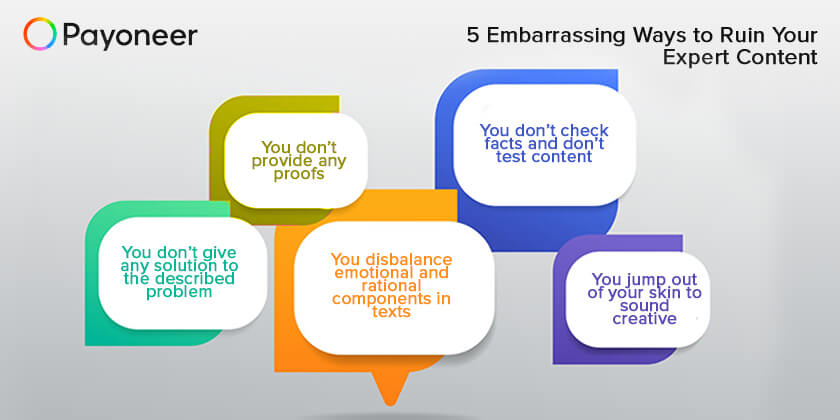
5 Embarrassing Ways to Ruin Your Expert Content
Editor’s note: This is a guest post from Mike Hanski.
Let’s cut to the chase:
This article is not about typos and grammar mistakes. If you write nothing but emotional and useful content, then readers will forgive you occasional most common mistakes or several writing cliches in texts.


Here we’ll speak of pitfalls able to ruin your expert content down to rock bottom.
1) You don’t give any solution to the described problem
Writing a text, you give information to a reader. But it’s not enough. A mere description of your product or service won’t be considered a content piece from an expert.
Expert content describes a problem, provides solutions to it, and puts wise to criteria:
- usability features
- price
- safety
- guarantees, etc.
Forget about writing the general truth. Build your expert content on practice, not theory so readers could find the best solution to their problems.
2) You disbalance emotional and rational components in texts
What do we love about canonical ads, both TV and outdoor? Their verve and visualization. A perfect wedding of words and pictures does wonders: delivers a sales message, catches the spirit of your product/service, and triggers emotions. The emotional response from the public is what matters: maybe they won’t run to buy your product at once, but they will remember it for sure. The rest is a matter of time.
Expert content is rational, as a rule, which is the very opposite of advertising. But it doesn’t mean you should forget about vivid images and emotions while writing.
Use them in a balanced and pre-dosed way. Emotions shouldn’t distract readers from useful information in your content or, what’s even worse, misrepresent it. If there’s a disbalance of emotional and rational components in your text, it looks ridiculous.
3) You don’t provide any proofs
When writing about cars better safety compared to planes, assemble an evidence base. Arguing that deal furniture is better than birch one, find arguments rather than merely tell about its “beautiful structure.” Well, you get the idea, don’t you?
Where to find argumentation and how to support it?
- Use statistics. This one is the most convincing when you need to explain why numbers are significant. Refer to it when you need factual data and the full context to bear out what you say.
- Share examples. They can prove your general statements in content are true. Examples provide details and specifics to a writer’s claims as well as help you catch readers’ attention.
- Ask experts and cite them in texts. They will share own interpretations of factual evidence and draw different conclusions, but you can compare them in expert content to support arguments and determine your personal perspective regarding the described problem.
4) You don’t check facts and don’t test content
Expert writing is hard. First, you do research and look for sources and opinion leaders to cite. Then, you think and analyze, check the gathered facts, work on outlining, text building, proofreading, and editing… It’s faster and easier to rewrite already published articles on your topic, right?
And this is where writers run into trouble…
They take texts of the same quality as their own, which are often far from expert. Don’t do that! Instead, rely on testing and fact-checking.
What’s the difference?
- Fact-checking: give your text to an expert in the niche so he could read it and correct tiny (or not) mistakes. It’s not about grammar or style but more about the authenticity of the information you provide.
- Testing: give your text to a friend who could be its reader. Ask for the feedback: is everything clear in the text; is it informative enough; does it provide solutions to his problem; what would he change or add to the text?
Unfortunately, far from all copywriters and content marketers do that. As a result, we have illegible texts with tons of mistakes.
5) You jump out of your skin to sound creative
Case in point:


Need more?


He who finds expertise and creativity here is welcome to cast the first stone at me.
How to Avoid the Above and Write Expert Content
Focus on a problem you need to solve with your content.
Think about how you will describe the problem and solutions to it. Keep the balance of rational and emotional aspects.
Describing your product or service as a way to solve the reader’s problem, make sure to provide arguments and proofs for it. Hit their insights, trigger emotions, and touch the “nerve” of the problem in your texts.
After your content piece is ready, show it to an expert in the niche and a couple of impartial friends who might be interested in the topic.
Your fingers itch to complement the article with something creative a la poetic description of gas-engine? Find an analogous example in this context, show it to impartial people (yes, again!), and listen to the feedback to decide if this trick is appropriate to use here.
And remember:
As a content creator, you might consider your text a writing masterpiece as it is. Your soul resists and your hand trembles to cut and revise content, but it’s a trap! Reading your work, you can’t hold the says even. That is why cold, objective feedback is the only way to turn your writing in expert content indeed.






